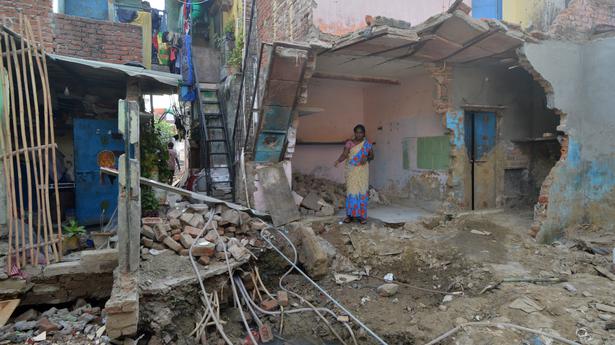
Families left in the open as govt. demolishes houses to fix water line
The Hindu
Officials promised to rebuild houses in 20 days but work is yet to start after 35 days, say Madrasi Camp residents
It’s past 8 p.m. on a hot weekday in the Capital. Atop a rusty air cooler, Rani, 40, a widow, has placed an induction cooktop and is busy preparing sambar for herself and her three children.
Swarms of mosquitoes circling around the cooler make it difficult for her to stand for even a minute. What adds to her woes is the condition of her one-room house — it is missing a roof, about two walls, and over two-thirds of the floor.
An electric bulb hangs from one of the three bars, which once supported asbestos sheets, and if she accidentally takes two steps to the right, she will fall two feet down into rubble, which used to be her house’s basement until early last month.
“It’s very difficult to sleep in this house with my children. They [children] keep telling me to send them to our village. But who will take care of them there?” asked Rani, who earns ₹8,000-₹9,000 a month working as a domestic help at four houses.
Like Rani, a total of eight one-room houses were fully or partially demolished by the Delhi Jal Board (DJB) in Madrasi Camp, a slum cluster in central Delhi, to move in machinery to fix leaks from a water supply pipeline, residents said. The officials had promised to rebuild their houses in 20 days but work is yet to start after 35 days, they added.
One of the affected families sleeps in a nearby temple after it closes for visitors. Rani sleeps in her almost demolished house, and another family sleeps in a house that has only three walls. Other families have found temporary accommodations.













